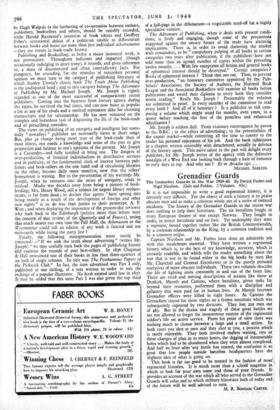Grenadier Guards
IF it is not impossible. to write a good regimental history, it is certainly very difficult. For the object of such a history is to praise obscure men and to make a coherent whole out of a series of isolated incidents. The history of the Grenadier Guards in the recent -war, does nothing to help their historians. The six battalions fought in every European theatre of war except Norway. They fought in tanks, in motor battalions and on foot. Yet undeniably they were a regiment, bound together rather like the British Commonwealth, by a common relationship ta the King, by a common tradition and by a common origin.
Captain Nicolson and Mr. Forbes have done an admirable job with this recalcitrant material. They have written a regimental history which is, to the best of my knowledge, accurate, which is certainly readable, and which tells the reader something about the war that is not to be found either in the big books by men like Mr, Churchill and General Eisenhower or in the purely personal narratives of more obscure individuals. "These two volumes describe the life of fighting units constantly in .and out of the front line. There are vivid and moving descriptions of actions like those at Dunkirk, Mareth and Camino, where battalions, given tasks far beyond their resources, performed them with a discipline and gallantry that were paid for in human lives. At Mareth fourteen Grenadier officers were killed in eight hours. At Camino the Grenadiers stayed for three nights on a frozen mountain Which was subsequently captured by two divisions. They. lost zzo men out of 483. But in the drama and tragedy of these great battles we are not allowed to forget the monotonous routine of the regimental soldier's life on active service. From his point of view there was nothing much to choose between a large and a small action. In both cases you shot at men and they shot at you, a process which
is rarely enjoyable. They both involved endless waiting, two or three changes of plan in as many_ hours, the digging of innumerable holes which had to be abandoned when they were almost completed. And half an hour after 'any battle has started, the confusion is so great that few people outside battalion headquarters have the slightest idea of what is going on.
This book is far too good to be treated in the fashion of most
regimental histories. It is much more than a school magazine in which to look for your own name and those of your friends. It provides an account of the war which all Who served in the Grenadier , Guards will value and to which military historians both of today. and of the future will be well advised to turn.
M. R Bthnws CARTER.


































 Previous page
Previous page